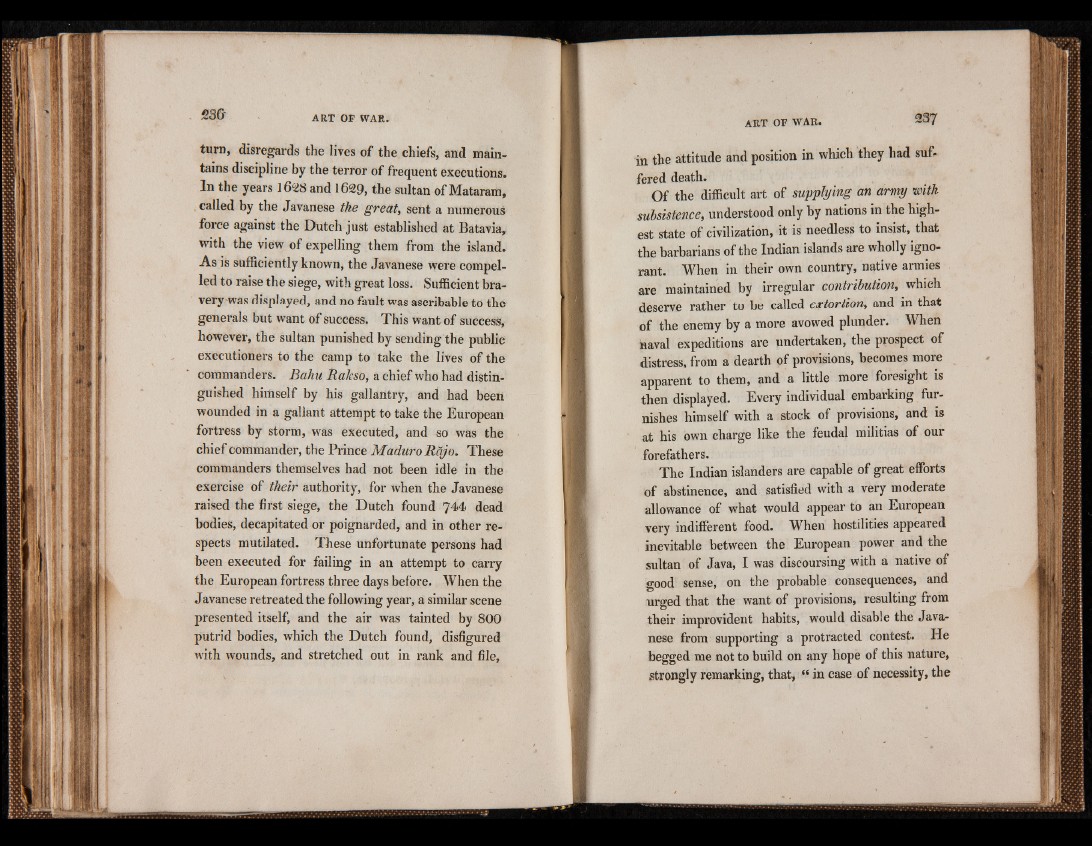
turn, disregards the lives of the chiefs, and maintains
discipline by the terror of frequent executions.
In the years 1628 and 1629, the sultan of Mataram,
called by the Javanese the greats sent a numerous
force against the Dutch just established at Batavia,
with the view of expelling them from the island.
As is sufficiently known, the Javanese were compelled
to raise the siege, with great loss. Sufficient bravery
was displayed, and no fault was ascribable to the
generals but want of success. This want of success,
however, the sultan punished by sending the public
executioners to the camp to take the lives of the
commanders. Baku Rakso, a chief who had distinguished
himself by his gallantry, and had been
wounded in a gallant attempt to take the European
fortress by storm, was executed, and so was the
chief commander, the Prince Maduro Rajo. These
commanders themselves had not been idle in the
exercise of their authority, for when the Javanese
raised the first siege, the Dutch found 744 dead
bodies, decapitated or poignarded, and in other respects
mutilated. These unfortunate persons had
been executed for failing in an attempt to carry
the European fortress three days before. When the
Javanese retreated the following year, a similar scene
presented itself, and the air was tainted by 800
putrid bodies, which the Dutch found, disfigured
with wounds, and stretched out in rank and file,
in the attitude and position in which they had suffered
death.
Of the difficult art of supplying an army with
subsistence, understood only by nations in the highest
state of civilization, it is needless to insist, that
the barbarians of the Indian islands are wholly ignorant.
When in their own country, native armies
are maintained by irregular contribution, which
deserve rather to be called extortion, and in that
of the enemy by a more avowed plunder. When
naval expeditions are undertaken, the prospect of
distress, from a dearth of provisions, becomes more
apparent to them, and a little more foresight is
then displayed. Every individual embarking furnishes
himself with a stock of provisions, and is
at his own charge like the feudal militias of our
forefathers.
The Indian islanders are capable of great efforts
of abstinence, and satisfied with a very moderate
allowance of what would appear to an European
very indifferent food. When hostilities appeared
inevitable between the European power and the
sultan of Java, I was discoursing with a native of
orood sense, on the probable consequences, and
urged that the want of provisions, resulting from
their improvident habits, would disable the Javanese
from supporting a protracted contest. He
begged me not to build on any hope of this nature,
strongly remarking, that, “ in case of necessity, the